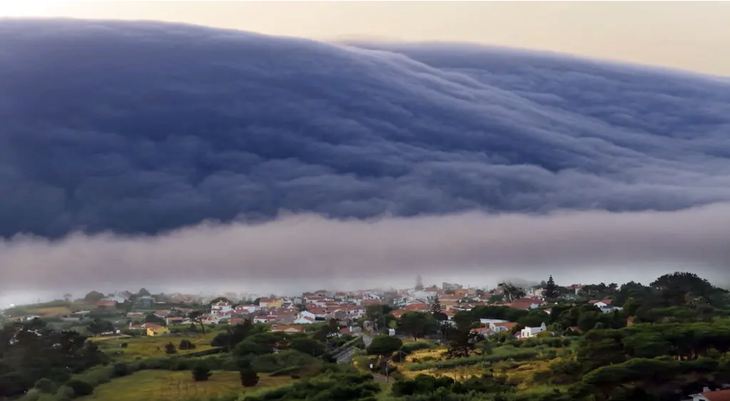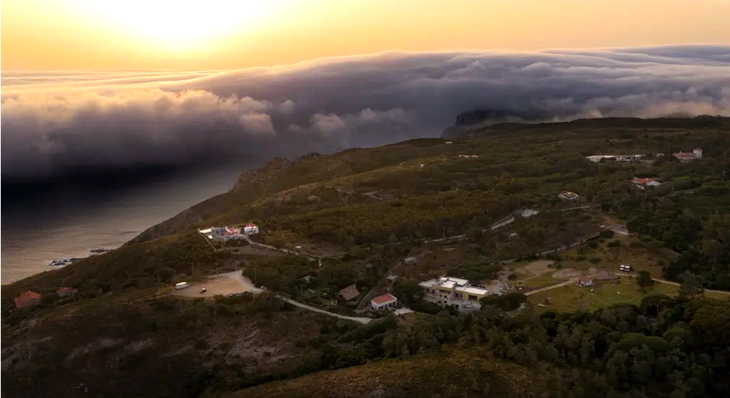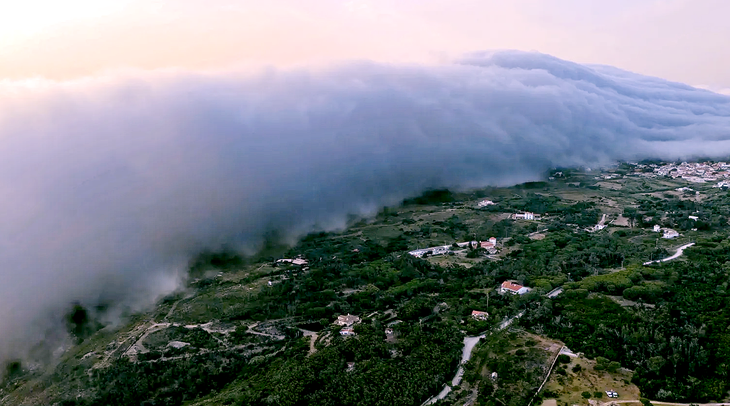
Drone images show rolling clouds coming in from the Atlantic Ocean near Cape Cabo da Roca, Portugal, on June 29 - Photo: AFP
On the afternoon of June 29, 2025, a giant rolling cloud suddenly appeared in the sky over western Portugal, crawling close to the sea like a tsunami about to hit the shore.
According to Fox News, the strange scene left many people swimming in the sea stunned, with one person exclaiming: "It's like something out of an apocalyptic movie."
Thought it was a tsunami, turned out to be… clouds
At the beaches of central and northern Portugal such as Peniche, Figueira da Foz or Póvoa de Varzim, hundreds of people witnessed the appearance of a giant cloud with a rolling shape, moving close to the sea surface, making many people think that a tsunami was coming.
Some people screamed, others stood still in fear. Tourists and locals immediately took out their phones to record and share the footage on social media.
"It feels like a tsunami straight out of a movie," Fox News quoted a person writing on X.

Rolling clouds make beachgoers look up at the sky - Photo: AFP
At Buarcos beach in the city of Figueira da Foz, Tiago Pinho, a local resident with a hobby of monitoring meteorological phenomena, managed to record a video of the cloud bank approaching at an unexpected speed.
"You see, it came so fast! The sky was still blue, and just a minute later it was covered," he told the AP.
However, not everyone understood that this was just a rolling cloud phenomenon. "Many people around me started to panic because they didn't know what was happening," Pinho recalled.
Rui Fernandes, another witness in the northern region, also recorded a similar sense of panic: "Anyone who has never seen this cloud before will probably think something big has happened."
"Roll clouds are tubular in shape, which if you've never seen before can be scary, but they're just clouds," meteorologist Mário Marques, founder of the climate platform PlanoClima, told iTV News.
The scene was both terrifying and fascinating. Images of clouds rolling across the horizon, looking like a giant wave of the sky, went viral on social media platforms around the world.

“Morning glory” - a special type of rolling cloud that often appears after dawn in the Gulf of Carpentaria in Australia - can stretch for hundreds of miles - Photo: AFP
Cloud Roll and Extreme Climate
After the initial shock, meteorological scientists began to explain this strange phenomenon.
The Portugal News quoted the Portuguese Institute of Marine and Atmospheric Meteorology (IPMA) as saying that this is a type of roll cloud, scientifically known as "volutus", with a long horizontal tube shape, formed at around 3:00 pm on June 29 offshore and began moving inland between 5:00 pm and 6:00 pm, in an area stretching from Peniche to Póvoa de Varzim.
IPMA also said the phenomenon was related to "atmospheric gravity waves", a type of atmospheric disturbance that causes up and down movements in the lower air layers, clearly recorded by Meteosat 3rd generation satellite imagery.
Roll clouds only form when there is an ideal combination of conditions: a large difference between the warm land surface temperature and the cooler air from the ocean, combined with high humidity and horizontal air currents.
Meteorologist Mário Marques explained to iTV News: "As the ground heats up during the day, the warm air rises. If a heavy cold air mass enters at sunset, it pushes the hot air up, creating the characteristic swirling of volutus clouds."
According to climate expert Paulo Ceppi from Imperial College London (UK), this phenomenon is nothing to worry about, even though it looks "very spectacular".
“They look like they go on forever, but they're not dangerous. There are many more important things to worry about with climate change,” the expert told People magazine.
However, experts note that roll clouds, once considered a rare phenomenon, may appear more often in the future as a result of global warming.
Temperatures in Portugal on June 29 reached nearly 116°F (about 46.6°C) in the Mora region, also a record high amid the prolonged heat wave that has just occurred in Europe.
Accompanying extreme weather events including thunderstorms, hail, strong winds and forest fires have also occurred in many places.
According to the New York Times , the heat wave across Europe has not only caused rolling clouds in Portugal, but also led to major fires in Greece and Turkey, killing many people.
Rolling Clouds: A Silent Sign of Climate Change
More than just a visual spectacle, rolling clouds like those in Portugal also illustrate a paradox of extreme weather: short-lived anomalies created by violent atmospheric disturbances.
According to experts, volutus clouds were once common in the Gulf of Carpentaria (Australia), where there is a frequent contrast between hot and cold air, but are now appearing in many other areas, as a silent sign of the climate changing in unexpected ways.
Source: https://tuoitre.vn/may-song-than-cuon-cuon-tren-bo-bien-bo-dao-nha-2025070613131952.htm
































































































Comment (0)